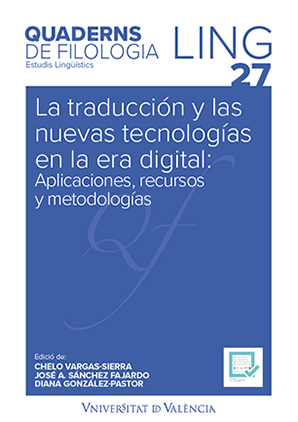The Language Engineer: A Transversal, Emerging Role for the Automation Age
DOI:
https://doi.org/10.7203/qf.0.24622Keywords:
machine translation, translation technologies, automation, natural language processing, human-computer interaction, digitalization, professional orientation Abstract
Abstract
This paper analyses the role of translators in a rapidly changing industry, which is strongly marked by digitalization and automation, and suggests the skills and competences translators will need to embrace to succeed in some branches of the industry of the (not-so distant) future. This research is based on an in-depth review of language-related positions in the current job market, as well as on recent survey-based research that sought to understand what roles translators are taking up currently, supported by web scraping of LinkedIn job data with Python. In today’s globalised world, language-related services imply and encompass many more positions than translation alone. Different areas of specialisation are proposed, which may lead to successful and sustainable language-related positions in the age of automation by following and implementing the trends of the industry. We analyse industry trends and skills and competences that will play an important role in the (not-so distant) future job market, and suggest a new, highly-technologised, tech-symbiotic role: the language engineer. Language engineers are people with the required profiles to succeed in the automation age, and will be able to commit to the multiple new, transversal language-related positions that appear as a result of recent technological developments. Numerous studies have drawn upon the “benefits” of technology in terms of productivity increase. Current market trends have also resulted in studies questioning the sustainability of the translation profession. Undoubtedly, technology changes our lives, but it’s up to us whether it does so for good or bad. In our relation with technology, we can resist, cooperate or reinvent ourselves. We consider that defending a Luddite position (resistance to technology) will only bring negative consequences for the profession. Therefore, we suggest the role of language engineers, who will not only cooperate with and benefit from technology, but will also see their skills and competences augmented to meet industry requirements and be up-to-date with technological advancements.
 Downloads
Downloads
Downloads
Published
How to Cite
-
Abstract1022
-
PDF (Español)1238
Issue
Section
License
 Este obra está bajo una licencia de Creative Commons Reconocimiento-NoComercial-SinObraDerivada 4.0 Internacional.
Este obra está bajo una licencia de Creative Commons Reconocimiento-NoComercial-SinObraDerivada 4.0 Internacional.
Authors who publish with this journal agree to the following terms:
- Authors retain copyright and grant the journal right of first publication with the work simultaneously licensed under a Creative Commons Attribution License that allows others to share the work with an acknowledgement of the work's authorship and initial publication in this journal.
- Authors are able to enter into separate, additional contractual arrangements for the non-exclusive distribution of the journal's published version of the work (e.g., post it to an institutional repository or publish it in a book), with an acknowledgement of its initial publication in this journal.
- Authors are permitted and encouraged to post their work online (e.g., in institutional repositories or on their website) prior to and during the submission process, as it can lead to productive exchanges, as well as earlier and greater citation of published work (See The Effect of Open Access).




